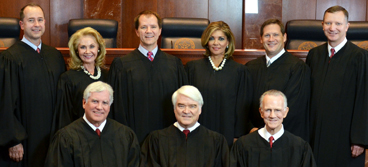© 2016 The Texas Lawbook.
By Janet Elliott
(AUSTIN) – Nov. 10 – In a case with potentially huge implications for beer and wine retailers, the Texas Supreme Court is weighing how much of a stake in a brewery could trigger Texas laws designed to separate brewers and retailers.
The justices recently heard arguments in an appeal by Mexican convenience store operator Cadena Comercial over the state’s denial of a permit to sell beer and wine in its planned Texas stores. Wal-Mart and other retailers are closely watching the case to see if the court adopts a strict “single-share” standard in determining ownership interests.

Critics say that such a standard would be unworkable and disadvantage new market entrants compared to existing permit holders. Supporters of the decision say a more relaxed view of the laws promoted by Cadena could effectively dismantle Prohibition-era laws in Texas and other states designed to promote moderation in consumption.
“Without this separation within the supply chain, Texas will experience market foreclosure for new entrants, overly aggressive sales and marketing, and potential recurrence of the consumption problems that led to the enactment of Prohibition in the early 1900s and that today plague those countries that do not mandate strict separation among the tiers,” former state Supreme Court Justice Harriet O’Neill argued in a brief written for the Center for Alcohol Policy.
Another former Texas justice, Dale Wainwright, disagreed. In a friend-of-the-court brief for Murphy Oil, Wainwright argued that the Legislature intended the proper standard to be “whether an entity in one tier of the industry has control or influence over an entity in another industry tier” – not the single-share theory.
A proper standard should prevent monopolistic tendencies and encourage a market-based operation for the alcoholic beverage industry, Wainwright, managing partner of Bracewell’s Austin office, said.

“Please tell us precisely what does and does not trigger each of the two steps that you must find to have a ‘tied-house’ violation,” said James Ho, a partner at Gibson, Dunn & Crutcher, who argued on behalf of amici Texas Association of Business and McLane Co. Inc.
McLane, a wholesale food and beverage distributor, is waging a battle in federal court over its efforts to get a permit to sell wine and liquor to stores in Texas. McLane is a subsidiary of Berkshire Hathaway, whose broad holdings include Wal-Mart. The company says the Texas Alcoholic Beverage Commission’s interpretation of cross-ownership interests violates the equal protection clause of the U.S. Constitution.
Assistant Solicitor General Joseph D. Hughes told the justices that more recent sessions of the Legislature have rejected bills to define market share as greater than a 5 percent ownership interest.
“A retailer whose corporate parent is one-fifth owner of a brewery holding company is precisely the type of cross-tier interest” that the Alcoholic Beverage Code was designed to prevent, Hughes said.
Debora Alsup, who represents Cadena Comercial USA Corp., showed justices a chart explaining the complex relationships between Cadena and European brewer Heineken. The Mexican holding company that owns Cadena includes subsidiaries that hold a 20 percent stake in Heineken and the brewer’s holding company.

“The direction of the statute is brewers dealing with the retailer,” Alsup said. “It is not a publicly traded company that has a minority stock interest in another publicly traded company that is a holding company of brewers that don’t even manufacture beer in Texas.”
Current Permit Holders in Violation, State Says
The Austin-based Court of Appeals affirmed the administrative order denying Cadena’s requested permit based on its interpretation of the T-ABC Code section 102.07(a)(1), which states that no “person” who owns a brewer or has an interest in one may own or have an interest in a retailer selling alcoholic beverages.
In response to a question from Justice Jeff Brown, Hughes conceded that there are a large number of current permit holders violating the statute. But, he said, the single-share theory is a hypothetical issue that arose during cross-examination of TABC’s licensing director.
“It’s not a rule that TABC has promulgated,” Hughes said, adding that the court need not struggle with enforcement or McLane’s federal court equal protection issue.
“The arguments of Cadena and amici are directed at the wrong branch of government,” Hughes said. “If there is a real problem with enforcement, the legislature can address it.”
Alsup argued that years of corporate law have established that subsidiaries are distinct from their parent companies.
“There was never even an allegation” that Cadena’s corporate structure was set up to evade state laws mandating separate ownership of manufacturers, wholesalers and retailers, she said.
© 2016 The Texas Lawbook. Content of The Texas Lawbook is controlled and protected by specific licensing agreements with our subscribers and under federal copyright laws. Any distribution of this content without the consent of The Texas Lawbook is prohibited.
If you see any inaccuracy in any article in The Texas Lawbook, please contact us. Our goal is content that is 100% true and accurate. Thank you.
